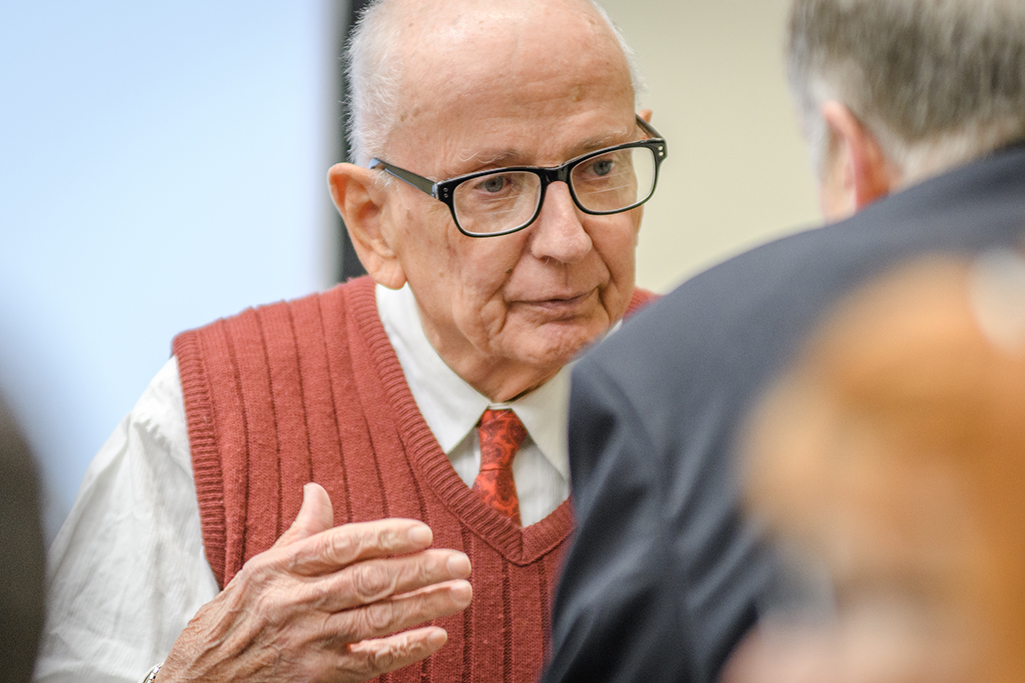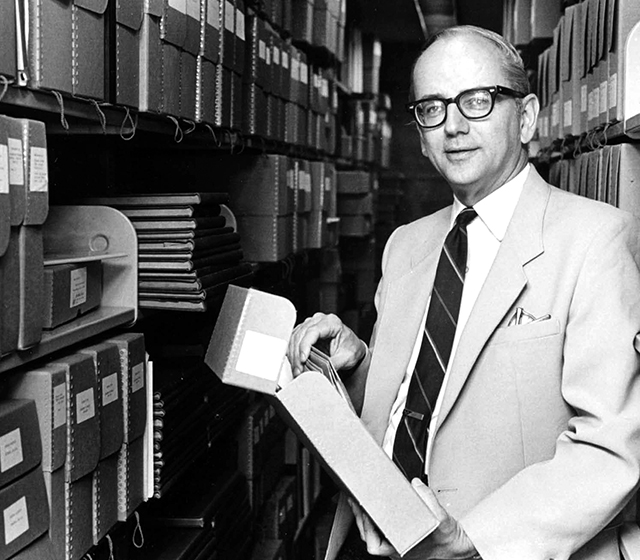In Memoriam
Geography scholar, historian, and activist William Koelsch has died

William “Bill” Koelsch, 89, professor emeritus of geography, retired University historian, and a longtime activist for LBGTQ rights, died on Nov. 5, 2022.
Koelsch, who established the modern Clark Archives, was well known on campus as the author of the highly regarded “Clark University, 1887-1987: A Narrative History,” a chronicle of Clark’s first 100 years, researched and written over five years and published to coincide with the University’s centennial celebration in 1987. The volume graces bookshelves across campus and remains an invaluable repository of Clark’s early history.
In a 2012 story in Clark magazine, Koelsch recalled that he convinced then-President Mortimer Appley to grant him some time off from teaching to craft the book, which he insisted would be a robust, accurate, and honest accounting of Clark’s past.
“Non-Clark people are more interested in the University’s early years, and Clark people tend not to know about them,” he said. “I tried to get the record reasonably straight about those years. It wasn’t a public relations piece — I attempted to call the shots as I saw them.”

Koelsch scoured the academic landscape for sources. According to the story, in the 1970s, he’d crossed the country looking for original manuscripts related to early Clark, conducted interviews with former faculty and administrators, and culled from the unpublished memoirs of former presidents Howard Jefferson and Appley.
“By the time I wrote, I was in a secure position against anyone who might want to squawk about something,” he remembered. “I can defend every sentence using the backup material.”
He earned a bachelor’s degree from Bucknell University (1955), a master’s from Clark (1959), and a Ph.D. from the University of Chicago (1966), and served several years in the U.S. Army Transportation Corps. He joined Clark as an assistant professor of geography in 1967 and later became a tenured professor known for his incisiveness, erudition, and wit.
“Bill was my first adviser when I entered Clark. He was a walking encyclopedia, but not in an intimidating manner,” recalled Jeremy Trasch, Ph.D. ’06, professor in the Department of Geography and Environmental Planning at Towson University. “My classmates and I valued his long list of chronological reference lists he shared in his class on the history of geographic thought — he introduced all of us to Clarence Glacken. Because of Bill, I went into Cambridge to find ‘Traces on the Rhodian Shore’ — we weren’t using Amazon in those days. He was kind and gracious, quietly knowledgeable, and ready to give his time.”
Clark Geography Professor Rinku Roy Chowdhury told the Worcester Telegram & Gazette that when she was pursuing her doctorate at Clark, she took a course with Professor Koelsch, who created a “welcoming and fun space in a really, really intense Ph.D. program and department,” allowing the students to “establish rapport and camaraderie, not just with the professor, but with each other.”
Koelsch, who retired in 1998, moved to San Diego, where he wrote more than 20 scholarly articles and essays, including articles about G. Stanley Hall and about the influence that Jonas Clark’s strong abolitionist beliefs had on the formation of Clark University. His book “Geography and the Classical World: Unearthing Historical Geography’s Forgotten Past” was published in 2012.
He also crafted many longhand, meticulously worded letters to friends and Clark associates over the years, often alerting them to his latest work or to approaching Clark-related milestones.
Koelsch made a memorable return to Clark in 2019 to speak at the invitation of the late Professor Robert Tobin, who had organized an exhibition titled “Queering Clark.” The retired professor recounted his personal experience as a member of the “silent generation” of gay men who came out later in life, recalling that he wrote columns for Boston’s Gay Community News under the pseudonym “A. Nolder Gay.”
In 1975, Koelsch began teaching a course at Clark on the gay liberation movement. In 1982, when the HIV/AIDS crisis was dawning, he incorporated information on the disease into the syllabus of his course Health and Disease in the American Habitat and spoke about HIV/AIDS to church groups.
In his return visit, Koelsch cited reasons for optimism about the future of gay rights in the U.S., noting with satisfaction that same-sex couples can now marry and an openly gay soldier can serve in the U.S. military. “I never expected to see either of those things in my lifetime,” he marveled.
Koelsch’s papers regarding his activism are in the ONE Archives at the USC Libraries. An oral history of his Army service is online at the Library of Congress.
He is survived by his partner of over 50 years, William Dennison.


